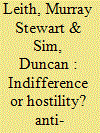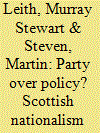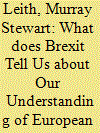| Srl | Item |
| 1 |
ID:
190770


|
|
|
|
|
| Summary/Abstract |
The UK's decision to leave the EU was partly influenced by a desire to reduce immigration. This followed a period of increased Euroscepticism, and an ‘othering’ of those of a different background, nationality or religion, and ultimately the EU itself. Post-Brexit, this has been linked to a rise in hate crime in England, and the referendum decision has been characterised as an expression of a strengthened English identity. Hostility towards those perceived as ‘foreigners’ or ‘others’ seems also to have affected people from the other nations within the British Isles, with speculation that Brexit might lead to the break-up of the UK. Here, we focus on Scots living or who have lived in England and, while their experiences are mixed, it appears that some hostility towards Scots (and indifference to Scotland) has grown. We speculate that this and additional political tensions may, eventually, bring about the end of the union.
|
|
|
|
|
|
|
|
|
|
|
|
|
|
|
|
| 2 |
ID:
096264


|
|
|
|
|
| Publication |
2010.
|
| Summary/Abstract |
The Scottish National Party (SNP) won control of Scotland's devolved government in the 2007 election yet opinion polls show no majority for its objective of independence in Europe. While the party is adept at exploiting short-term political opportunity structures in the wider British context, as well as appealing to the 'opinion electorate', it appears less successful at persuading a majority of Scottish voters to agree with its core ideology. Helpful parallels can be drawn between 2007 and the last time the party polled over 30 per cent of the popular vote in Scotland at the 1974 (October) British General Election-then, as now, the Scottish voter appears to be willing to distinguish between party and policy.
|
|
|
|
|
|
|
|
|
|
|
|
|
|
|
|
| 3 |
ID:
168760


|
|
|
|
|
| Summary/Abstract |
This paper reports on a number of Eurobarometer surveys undertaken by the European Commission as a way of reflecting on Brexit and the challenges it poses to European identity. Our work with the surveys has been undertaken in the context of developing an educational game (RU EU?) which will explore European identity. European citizenship and identity have been strongly promoted by the EU but, while they appear to have been accepted at an elite level, the EU—and the UK in particular—have so far not constructed a narrative which has been supported by ‘ordinary’ citizens. Brexit has therefore exposed the failings of European elites in this regard. That said, there is some evidence that the complexities of Brexit have led to a strengthening of European identity in the other EU 27 countries.
|
|
|
|
|
|
|
|
|
|
|
|
|
|
|
|